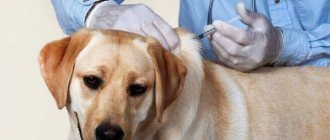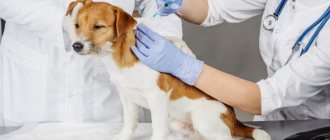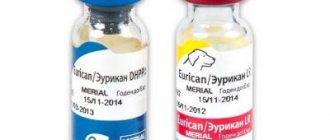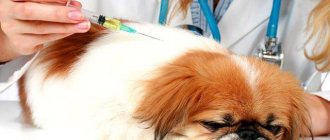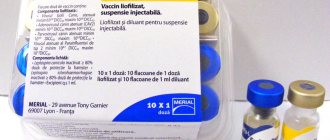Why is vaccination necessary?
A vaccine helps a dog develop immunity to a specific infection.
It contains fragments of an infectious agent, which, when entering a living organism, causes a corresponding reaction in the form of the production of antibodies. Subsequently, if the pet encounters a similar invasion of infection, it will not get sick or the disease will be mild. Dangerous diseases of dogs for which mandatory vaccination is carried out:
- rabies;
- plague;
- enteritis (parvovirus, coronavirus);
- adenoviral infections;
- leptospirosis;
- infectious hepatitis;
- parainfluenza;
- parvovirus
There are also vaccines against lichen, trichophytosis, and microsporia.
At what age are puppies vaccinated in case of possible danger?
Contacting a veterinarian earlier than the specified period is justified only if the baby is at risk of contracting a serious disease for which he has no immunity. If the mother's body is not strong enough to cope with the virus or infection, an injection must be given at 4-6 weeks. Often such situations arise in nurseries, where there are many puppies and there is a high risk of a real epidemic. At 10-12 weeks, vaccination is repeated. The next time the necessary drugs are administered after 3-4 weeks.
For early protection, special vaccines have been developed, which differ from their analogues in that they contain less aggressive active ingredients that cannot harm the baby’s health (the series is called PUPPY - “Nobivak Puppy DP”).
Types of vaccines for dogs
Nobivak preparations for dogs help prevent the development of the most common viruses
Based on the active component, dog vaccines are divided into attenuated and inactivated. The former are pathogens capable of reproducing. However, due to their weakening, they cannot cause the disease itself, but only stimulate the production of antibodies. The inactivated version is represented by dead microbes. Such vaccinations have a slow and short-term effect, so they need to be repeated.
In addition, there are mono- and multivalent vaccines. In the first case, the composition includes antigens of only one infectious agent. Examples of such vaccines are: Biovac-D, Multikan-1, EPM, Primodog, Kanivac-SN, Rabizin. Several infections are included in the composition of polyvalent drugs. These include: Multikan-4 (6.8), Nobivak, Hexakanivac, Vanguard-7 and others. Multi-strain drugs, as a rule, are not given to puppies, as they put too much strain on the immune system.
Vaccines can be of domestic or foreign origin. Among the Russian drugs that have proven themselves well are: Hexakanivac, Multikan, Vakderm, Polivac. Among the “foreigners” the following stand out: Nobivak, Eurikan, Vanguard, Hexadog. Each drug has its own characteristics and administration regimens.
Most often, vaccines are given subcutaneously (at the withers)
What is vaccination like?
A vaccine refers to special preparations that contain weakened or dead viruses and bacteria. When vaccinations are introduced, dogs develop an immune system to certain diseases - specifically, antibodies are produced. They usually form within two weeks after vaccination.
Vaccination of adult dogs
Vaccination of an adult dog
Dogs over one year old are required to receive annual vaccinations: injections are given once at regular intervals. It is allowed to vaccinate four-legged friends against infectious diseases once every 2 or 3 years, but the rabies vaccination must be given strictly after 12 months.
If the dog is elderly or elderly, then the decision about whether to give injections or not is made based on its health condition. The vaccine can provoke an exacerbation of the pet’s chronic diseases and further weaken the immune system. Again, a rabies vaccination should be given in any case. According to current legislation, the owner cannot refuse it.
Consequences of vaccinations
After vaccination, the owner should pay special attention to the condition of the pet.
Local complications arise directly at the puncture site. These may be swellings and even lumps . Bumps are observed in 5% of cases after vaccination. Some owners try to fight them: rub them, massage them, warm them up. There is no need to do this; this is a normal reaction of the skin and adjacent tissues to the drug and the puncture itself. Normally, swelling and bumps go away after 10-14 days, that is, by the end of quarantine. Sometimes they can last up to a month. But this is not a cause for concern; you should consult a doctor if the swelling or lump increases in size.
Norm:
- The dog is lethargic,
- Her temperature rose slightly
- She missed feeding once
- Appetite is slightly worse than usual
- One-time vomiting or diarrhea was observed.
How to vaccinate correctly
In order for the vaccination procedure to have only a positive effect on the dog’s body and not lead to complications, you need to adhere to some rules.
- The dog must be completely healthy. Even the slightest malaise, lack of appetite, fatigue and other conditions are reasons for postponing the injection.
- Before vaccination, your pet must be dewormed. Anti-worm medication must be given 14 days before the procedure.
- It is not advisable to vaccinate dogs while they are changing their teeth. A number of drugs have the ability to change the color of tooth enamel.
- Vaccinations are not recommended for puppies under 8 weeks of age. Early administration of the vaccine will weaken the immunity acquired from breast milk. And since they don’t yet have their own, the puppies may be completely defenseless against infectious diseases.
- In addition to deworming, the dog must be treated for external insects. The treatment is carried out the same way two weeks before vaccination.
- Most vaccines have a negative effect on the development of the fetus, so if dogs are to be mated, the vaccine should not be given. At least 12 weeks must pass between vaccination and mating.
- It is best to vaccinate on an empty stomach.
- If your dog is prone to allergic reactions, you can first give it an antihistamine. Which one it is better to consult a doctor.
We should not forget that after vaccination, the pet may develop anaphylactic shock, so for the first few minutes you need to stay close to the veterinary clinic.
Where do dogs get injections for major viruses?
When to vaccinate a puppy: why it is not recommended to visit a veterinarian before 2 months
photo from the site: RANDRS.ru
Some people believe that the sooner they take their puppy to the vet, the better it will be for him, but this belief is only formed from a lack of information. Why can't you hurry? Next, we present two fairly weighty arguments:
- The first has already been announced: the vaccine will not work properly because maternal antibodies will interfere with it. The effect of such an injection will be zero.
- The second is this: the baby’s immunity has not yet formed and is working at half its capacity. Do you want to get the expected results from your visit to the doctor? Then wait up to 2 months.
However, everyone knows that for every rule there is an exception. It also exists for vaccinating our little brothers.
Features of rabies vaccination
Although the overall situation with rabies in Russia is favorable, the possibility of an outbreak of this dangerous disease remains. Russian legislation obliges every owner of a four-legged friend to vaccinate him once a year. If the dog owner refuses to vaccinate his pet, he will face administrative punishment.
The law also provides for free rabies vaccination. Such vaccinations are not included in the cost of services even in private clinics. To get an injection, you can go to a state veterinary hospital. Often, primary comprehensive vaccination against infectious diseases in a state hospital is paid for, and further actions according to the scheme will be free. Moreover, if you get a rabies vaccination in such an institution, then the accompanying events will also be carried out free of charge. Among them: examination of the animal, anthelmintic therapy, registration of a dog passport, installation of a chip.
Veterinary passport
An international veterinary passport is the most important document for a dog, without which long trips with a dog around the country, travel abroad, participation in exhibitions and breeding are impossible.
The most important points of a dog’s veterinary passport are:
- vaccination against rabies and other infectious animal diseases;
- flea and tick treatment;
- deworming;
- reproduction.
The document also contains information about the owner of the animal, identification (in the case of implantation of an electronic chip) and some characteristics of the dog, in particular gender, color and special features.
How much does vaccination cost?
Prices for preventive vaccinations for dogs vary depending on many factors:
- features of the vaccine (manufacturer, composition);
- vaccination location (home or clinic);
- pricing policy of the veterinary institution (budget, average, premium, luxury).
For example, giving an injection at home will cost 500 rubles more than if you bring your pet to the clinic. It will be more expensive to vaccinate a dog with an imported complex vaccine than a domestically produced one. On average, the cost of a comprehensive vaccination is about 1,500 rubles.
Don't forget to vaccinate and your dog will be healthy!
Exceptions to the rules
Sometimes the vaccination schedule may shift. Typically, this may be influenced by the following factors:
- Epidemiological situation in the area. The standard vaccination schedule may change based on dangerous outbreaks of infection. In this case, puppies can begin to be vaccinated at one month of age with special vaccines.
- Being forced to move early can also shift your schedule. In this case, you must adhere to the following rule: vaccination should be given no earlier than one month of age and no later than 10 days before the planned trip.
- Particular attention should be paid to puppies raised without a mother; a very important factor is how many days the first vaccination was given. Since, on the one hand, they need to increase their immunity, and on the other, try to carry out immunization in the most gentle manner. They can begin vaccination at 6 weeks of age, and subsequently reinforced at 9 or 12 weeks.
Where is the best place to vaccinate?
Many owners try to vaccinate their pet at home. On the one hand, the dog feels more confident, which has a positive effect on its health and ability to tolerate vaccination. However, there is a danger that the animal’s condition may sharply worsen, for example, due to an allergic reaction, anaphylactic shock, and then emergency veterinary care will be required.
It is best to bring your pet to the clinic, undergo a preliminary examination, get a vaccine and wait a while. You can walk around the clinic or sit in the car. After making sure that everything is in order with the body’s response, you can go home.
Any owner wants to see their pet healthy and cheerful. The key to such a dog’s condition is timely vaccination.
Should puppies be vaccinated after teething?
photo from website: boombate.com
Some vaccines used by veterinarians can cause darkening of the enamel. Because of this, it is practiced to carry out the necessary procedures before changing teeth (up to 3 months). You can give the injection after it (at the age of 6 months). However, the latter option entails many risks, since it is during this period (4-5 months) that there is a danger of contracting such serious diseases as canine distemper and enteritis. Do not delay making an important decision - consult a doctor on time.
Complications
Many owners are afraid not so much of the vaccination itself, but of the complications it can cause. At the moment, the complex vaccine administered to dogs is of high quality, and side effects occur extremely rarely, but their occurrence cannot be completely excluded. The first post-vaccination day is considered the most difficult, and the dog needs to be given increased attention during this time. If the pet is apathetic and lethargic, refuses to eat, and has a slight rise in temperature, then there is nothing to worry about. Many people wonder how long such symptoms can last. The next day everything should go away. If after a day there is no improvement, the dog has a fever, vomiting, diarrhea, drooling, or convulsions, then it is necessary to immediately consult a veterinarian.
As soon as the long-awaited dog appears in the house, the owner needs to decide on a clinic, since it not only needs love, but also protection. The veterinarian will help you choose an individual vaccination schedule, which will determine not only your life expectancy, but also your health.

